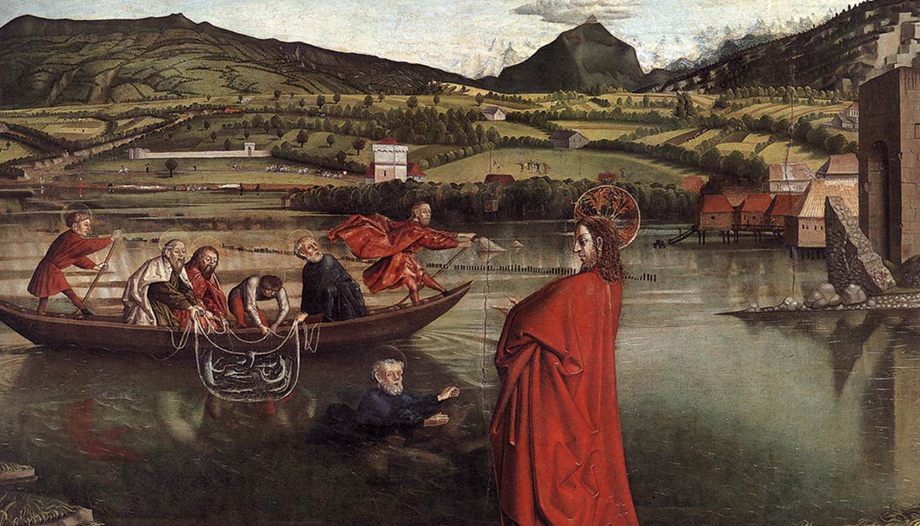The miraculous catch of fish in John's Gospel takes place after the Resurrection. It is an episode of daily life and of the disciples' work to earn their living, with symbolic meanings. They are seven, a perfect number that can allude to the fullness of the Church. Simon Peter guides these fishermen as he guides the Church and takes the initiative of fishing, an image of the evangelization of the world. There is Thomas, who made the most beautiful act of faith at the end of the Gospel. "My Lord and my God."and Nathanael who did it at the beginning: "Rabbi, you are the Son of God.". There are the sons of Zebedee and two others: we are all there.
Jesus from the shore looks at our life with kindness and concrete interest: do you have something to eat? This is how he looks at the Church every day. The miracle of the catch of fish tells the beloved disciple that "is the Lord." on the shore : the facts of grace move to faith. Peter throws himself naked into the water: like dying and being reborn in the waters of baptism. With the power of grace and of the encounter with Jesus, Peter succeeds in pulling out of the boat the 153 fish that a little earlier all together brought to the shore with difficulty. He used to count the fish to report the feat; now he does it to testify to the miracle. The net is the communion of the Church. Counting the fish one by one is the work of welcoming and treating each one according to his or her different personality and vocation. In the same sense Jesus speaks to Peter about caring for lambs and sheep; he has already spoken to them about the one flock.
To the question: "Simon, son of John, do you love me more than these?", Peter does not dare to answer "I love you" or even "more than these". The experience of denial after having promised "¡I will give my life for you!"He is humbled. He saw the beloved disciple leaning on Jesus' breast and strong under the cross: he no longer dares to think that he has more faith and more love than the others. Answer: "Yes, Lord, you know that I love you." and Jesus in the following questions adapts Himself to him. In the second one he no longer compares himself with the others, but continues to ask him, "Do you love me? Peter still does not dare: "Yes, Lord, you know that I love you." Jesus approaches in the third question: ¿do you love me? Peter understands that he is accompanying him on a journey to erase the three negations. And he responds with confidence: "Lord, you know everything, you know that I love you.". The deeds that Jesus asks as a consequence of this love are always to feed his sheep. With adequate food, as he chose bread, fish and coals adapted for his disciples. Peter would not dare to say as before the passion, relying on his strength: "I will follow youé wherever you go".. Then you can tell Jesus: "Follow me."
Homily on the readings of the III Sunday of Easter
The priest Luis Herrera Campo offers its nanomiliaa small one-minute reflection for these readings.












